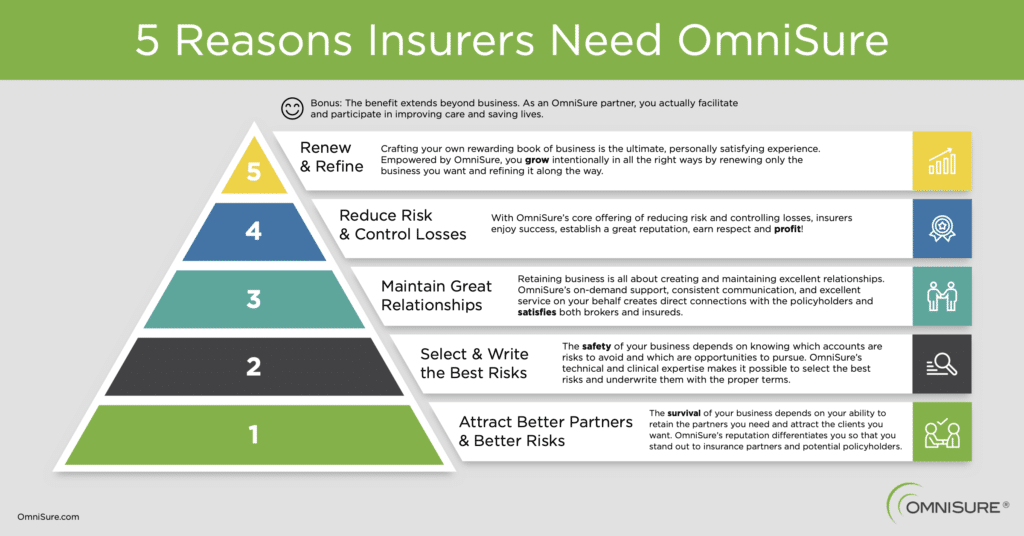With mental health concerns and substance use on the rise, it is no surprise that OmniSure’s insurance partners are becoming more inquisitive about the risks associated with mental and behavioral health, most specifically Addiction Treatment. Here is how OmniSure’s AVP of Risk Services has answered some of the underwriters’ questions.
One of the most significant and frequent risk management and safety issues in addiction treatment facilities is associated with detox. Clients usually arrive and go through detox before beginning the center’s recovery program. This is a vulnerable time for clients, as they often suffer some level of withdrawal in the detoxification process. Their physical health is often compromised as well. Risk issues to screen for include:
- Inadequate assessment for types and amounts of substances used
- Inadequate monitoring and treatment for coexisting medical problems, such as Diabetes, Heart Disease, and Liver Disease
- Inadequate staff training
- Complications of detox, such as severe withdrawal and seizures
- Dual Diagnoses
- Infection Control; and
- Slips and Falls
Adequate assessment for amounts, types, and length of time the client has been abusing drugs and alcohol is important. Many facilities include comprehensive drug and alcohol testing as a key part of the assessment process. In addition, the assessment process should involve a physical exam to identify injuries, abscesses, and baseline vital signs. Equally important to the assessment process is the identification of psychiatric and medical conditions and medications prescribed.
Once identified, additional conditions must be documented and monitored. Rapid response to worsening conditions is critical. There is often a delay in detox, due to staff inattention and failure to monitor. Common medical problems in the detox period include abscesses, cellulitis, seizures and uncontrolled medical conditions. Severe withdrawal can also occur. While most clients go through withdrawal with minimal complications, for some withdrawal can be deadly.
Occasionally, there is inadequate staff orientation and ongoing training in treatment facilities leading to delays in recognizing and responding to a new or worsening condition related to their physical or psychiatric issues. It is easy for staff to become complacent in an addiction treatment center, as many clients don’t suffer serious detox or other complications.
Infection control is important in detox as well. During a recent risk assessment a nurse was observed carrying a urine specimen in her ungloved hand which she then placed directly on the desk in the nurses’ station. As in all healthcare facilities, handwashing is vital to infection control. Proper PPE must be used when handling all blood and body fluids. Clients with open wounds should have them regularly cleaned and dressed.
Slips and falls are not uncommon in detox. General client debilitation and compromise can lead to falls. We recommend that as part of the comprehensive assessment, a fall risk be completed.
In today’s pandemic environment it is of even greater importance to make sure good things are offered for the mental health of both clients and staff, for example, self-care options, meditation and mindfulness exercises, journaling, more time outside, gardening, art, gym equipment, exercise programs. And, most importantly, having well developed policies and procedures for prioritizing transparency and communication with clients, staff, the community, and families about how the facility is managing COVID-19 are key reduction strategies.
With the additional layer of complexity as it relates to COVID-19, Underwriters might want to ask some questions:
- Does the facility require documentation from a doctor before the admission? If so, do they stress that a telehealth examination is sufficient so as not to overwhelm hospitals, emergency rooms, and urgent care clinics?
- Is there a protocol for quarantine?
- Does the facility have a Crisis Response Team and a plan for worst case scenarios?
- How are they using online services such as Zoom for inpatient, outpatient and discharging clients?
- Are they assisting clients with group meetings online and relapse prevention resources?
Resources for additional information:
naatp.org National Association of Addiction Treatment Providers
naadac.org National Association for Alcoholism and Drug Abuse Counselors
thenationalcouncil.org National Council for Behavioral Health
samhsa.gov Substance Abuse and Mental Health Services Administration
cdc.gov Center for Disease Control
